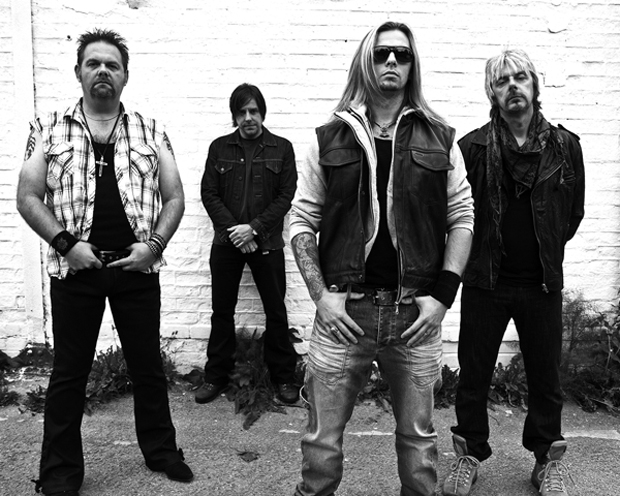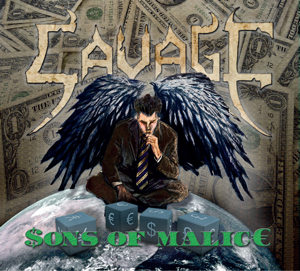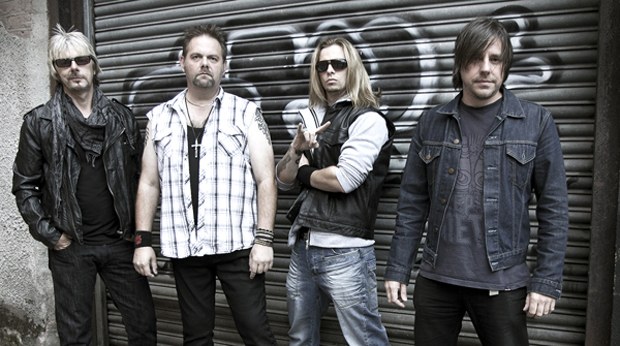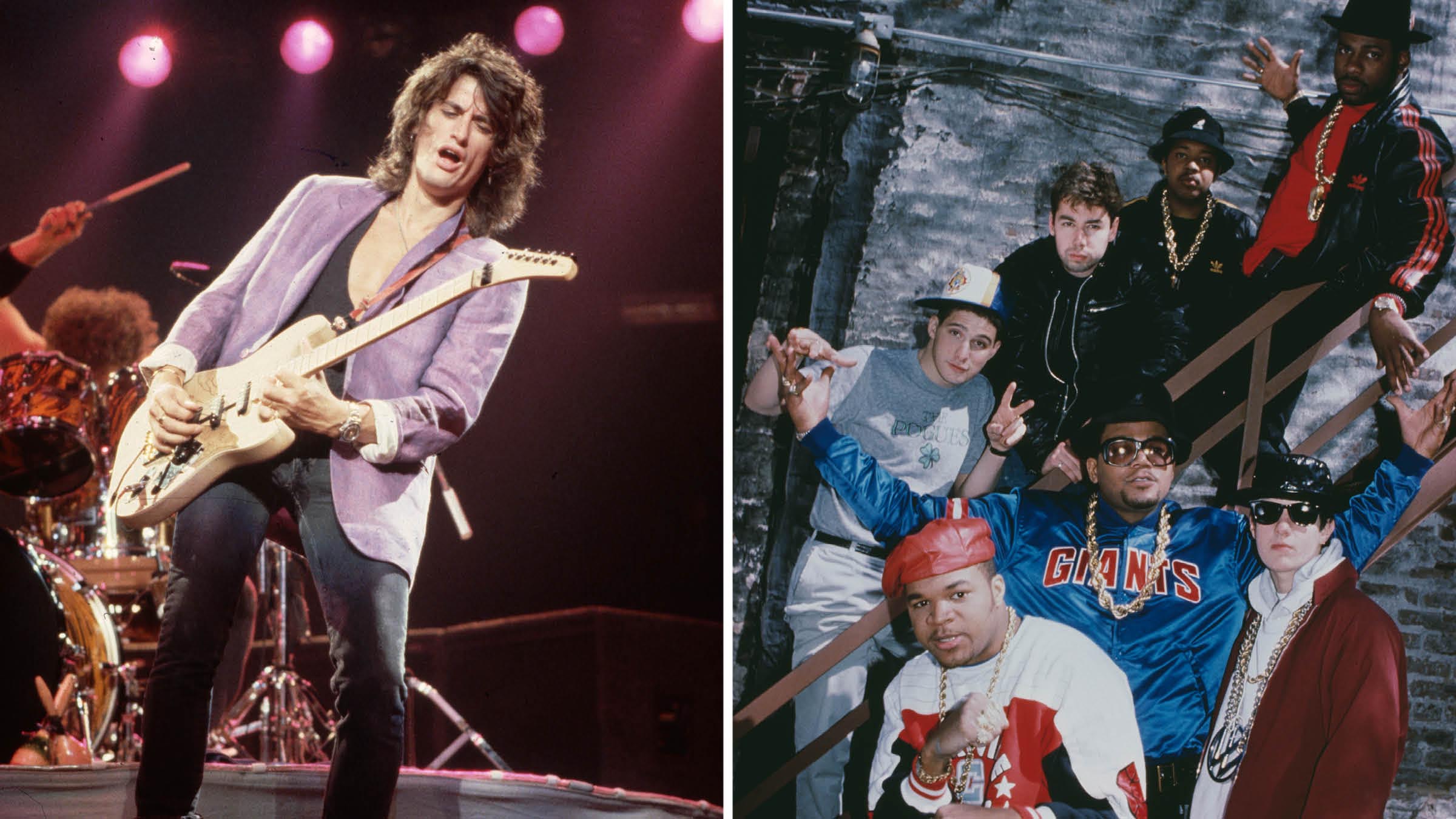Interview: Savage Discuss Production, Playing Techniques and Vintage Gear
All the latest guitar news, interviews, lessons, reviews, deals and more, direct to your inbox!
You are now subscribed
Your newsletter sign-up was successful

Rejuvenated British rock veterans Savage have made a strong comeback this year with their sixth studio album, Sons Of Malice, a solid 13-track effort that captures the vibe of Savage's classic sound but with a modern approach.
I recently caught up with bassist/vocalist Chris Bradley and guitarists Andy Dawson and Kristian Bradley for a two-part interview. Part one deals with the band's comeback, the new album and the early days, and you can read it here.
In Part two, they talk in detail about the production values on this new album, how their playing techniques have changed over the years and their vintage gear, among other things. You can read this part of the conversation below.
GUITAR WORLD: You mentioned in the first part of this interview that you want to do a live recording at some point. If there is a live recording any time soon, how different would it sound to the album? How different is Savage live as compared to the studio?
Chris: Yeah, there's a bootleg from when we played in Holland back in the day with Metallica, and the energy is incredible. So it's just like another 25 percent of energy, drive and excitement because in the live situation the adrenaline is always there. So it's just going to be better, I think. You do the best album you can, and you want to go out there and reproduce it, but just add that kind of energy, which you can only get when playing in front of an audience. So that's what we want to do with it.
Andy: We've also got six albums' worth of material to work on, and although each of the albums are distinctly different from each other, when we actually play the songs from those albums together live, it seems to be a much stronger gel, and it's actually quite easy to mix those songs into the set.
It gives the music a whole another level, because it still sounds like the band, even though when you put the albums individually, it all sounds very distinct, depending on the studio we worked with at the time and where we were in terms of writing. When we play live, it all seems to come together in a coherent manner.
All the latest guitar news, interviews, lessons, reviews, deals and more, direct to your inbox!
Chris: Another thing is, you stick us in a rehearsal room, turn the amps on the put the PA in there, strangely enough we'll sound exactly like how we were on the album. I think that's something we work toward in terms of the production and engineering. It's no good fine-tuning the guitars and vocals and making yourselves sound pitch-perfect like a Queensryche album, and then you sound like AC/DC on stage. We've certainly got a "live" sound in the album I think, specially the guitars. Mine and Andy's rhythms complement each other.
How much of a role did production play in creating this modern type of sound on the new album?
Chris: Mark the drummer did the engineering and mixing, and we all agree he's done a fantastic job on it. It's the best sounding album we've ever done.
Andy: And that's because for the first time, someone has captured what the band sounds like.
Chris: You have technology like Pro Tools, so you have the capabilities, but you still have to really capture the organic-sounding drum kit, amps and vocals. Mark has done a brilliant job in doing that. So it wasn't like who we want to sound like or what's the style of the production. It was really just about making a great-sounding album that captures the guitar tones. It sounds like it should sound. It's a perfectly good representation of what we were playing, which sounds like a really simple thing to do, but most albums fail to do that. It sounds modern because the technology is there to do that.
But was it challenging for you to get back to the level of musicianship you had back in the day?
Andy: Not for me, no. I've always been a rock god so it's not very difficult for me [laughs]. But we've always played music. Even when Savage was not active, I played guitar whenever I could. So it wasn't like dusting off guitars or anything like that. So it was kind of easy because I think you just mature as a player and musician and therefore it's quite easy of get back into the place. Before Kristian, we never really had a strong second guitar player. So a lot of the stuff I've played has been all about rhythms. So having a guitar player who has his own identity just beefed up our sound, and Mark is the best drummer we've ever had. So it's kind of easy to be honest. If we come up with a good idea and we all play it, it instantly was like, that sounds amazing and we know exactly where we're going with it.

Chris: For me, my voice has changed a little over the years, purely and simply because of me getting older. The reality is, I can still sing songs off Loose 'N Lethal, but I don't naturally sing that way anymore. We were very young when we did that album. At that age, there's still an element wherein your voice is changing and breaking as you get older. You've only got to listen to Metallica's version of "Let It Loose" off of the first album.
Everybody comments that they think it's Dave Mustaine who did the vocals. It's not, and it's actually James singing. That's how much James' voice has changed since he did that song. It's a natural progression. The range of singers goes slightly lower. So I just sing in the range that's comfortable for me, but I can still do the Loose 'N Lethal stuff if I need to.
You talked about maturing as musicians. In terms of playing techniques, did you employ any techniques on the new album that you might have learned over the years, techniques that were not apparent on the debut album, for example?
Andy: May be a little. When we started out, we were quite naive as players. There's something really fresh about that though, because you don't know the rules, musically, or certainly the theory. So you kind of play what sounds right, and then when you mature as a player, you begin to learn more about the instrument.
You can learn different styles of playing, and it can actually be a bit of an issue when it comes to trying to capture the kind of band we are. In a way, we were trying to leave that out of the studio because we still wanted the band in essence to be a kind of drive-in, fairly simple and primal sounding band. So some of that technique and theory you learn over the years as a player is left out of the door because you don't want to fundamentally change how the band operates, if that makes sense.
Kristian: Yeah, we didn't sit and decide that we have to write a song in E# or incorporate a sweeping arpeggio into it. It was just a case of, this is how we play, this is a riff that sounds fantastic, let's work on this and take it from there, and the song sort of progressed and evolved into what it is now. There was no conscious effort to sit and go all guitar nerdy about it and write an early-thrash sounding "Let It Loose" type of song. My background personally, as my dad eluded to earlier, is predominantly thrash metal. I'm in a thrash metal band where there's a lot of fast chugging, but there's none of that on this album.
Chris: Plus, because of your naivety, you think that you just need to throw everything and your kitchen sink into it. Andy used to play guitar as fast as he could. In my case, I needed to scream as many times as possible, in every song. Now I don't feel the need to do that anymore. It's not necessary.
Andy: It's about what to leave out. I think that's what you learn (laughs).
Coming to the gear part, what's the difference in the gear you are using now as compared to back then?
Andy: I've got a Gibson Flying V that I've had since I was 16. I did use that, not on all the albums, but on some tracks. I was using a Gibson Les Paul on most things. All my rhythms have been done on Les Pauls, so guitar-wise, it's the same kind of kit. The amps have changed, though.
Back in the day, when we started, I was using Marshall Super Leads but I was using a distortion pedal to get the drive. At the time, that worked out. But as technology and amplification moved on, endless different amps have come up. Now I've improved most of them. The rig that I've got now, it's not a particularly common amp. It's the Randall MTS. It's a modular system. It's all valve, but tonally, it's the best thing I've ever played.
I've tried everything in the last few years and then I went back to it. It's gives you a Blackstar sound in your head. It's the sound you've always wanted, and you kind of go, "Wow, it's actually there now for the first time!" And then having been able to record and capture that sound has been great. I's still pretty much a driven kind of Marhsall-esque tone, but the Randall has got a certain quality to it that I don't get in most other amps I've tried. I've been offered endorsements with famous amp makers, but it just doesn't work for me. I've tried various Marshall maps that I would have used in the past, but the Randall rig speaks for itself in terms of tone.
I think endorsements are like a catch 22 for musicians, because you're getting it for free, but then it might not be the gear that works best for you. Would you agree with that?
Andy: Yeah I'm sure there are guitarists out there endorsing various amp brands, but may not be using them in their regular setup and they are happy to be seen in advertisements or whatever. I couldn't get an endorsement with Randall. They wouldn't talk to me at all (laughs). But I'm not gonna not use it for that reason, whereas I could have had a Framus Dragon 3 Channel for a few months.
It was fine, it's a good amp, but I'm not gonna go with a particular brand because it's easy and cheap. You've got to get the tone that you want, and in your head it's got to be the sound you've been looking for. It's taken me a long, long time to get an amp which does that. But I keep trying still, and I've bought other amps since. I still will do, but I'm sure I'll keep coming back to the Randall, for now anyway.
So, if you're endorsing a product and don't actually use it, is that allowed? I mean, as long as you're advertising the product, is that fine with the company?
Andy: I didn't sign any endorsement deal in the end, but I think the general thing is you give some photos and comments which they place on their advertisements and website, and that's just for them for use. I don't think that you then actually get forced to be seen with that gear every time you play a gig or whatever.
But it depends on the endorsement deal, and in some cases the musician might get paid to exclusively use certain brands. Joe Satriani was endorsed by Peavey, had his own signature amp, but for whatever reason, he fell out of that and started using Marshall. He wasn't endorsed by Marshall. He is now, but at that point he must have thought the Peavey amp is not doing it for him and he wanted to get away from that.
Chris: For me, I'll never get an endorsement because the equipment I use doesn't exist anymore! I use vintage gear. Basically I'm a Trace Elliot guy. I use the Trace Elliot pre-Gibson. I've got the classic stuff with the fluorescent tubes on them, and as for basses, I still use the same basses from back then.
I've got a Fender Precision that I used on Loose 'N Lethal, and my favorite bass is the Kramer EMZ-4001, the one with the aluminum neck. I've used that on every album we've recorded since Loose 'N Lethal, and I've since used it live because the tone I sustain on it is awesome. So as a rig, I haven't really changed much, and I only use one effect and that's a simple straightforward Boss flanger unit.
You said that the gear that you're using, those brands don't exist anymore. Does that mean you need to take extra care of your gear?
Chris: Yes, I have to be very careful with it. But believe it or not, there are lots of companies out there that sell parts of these things. The original guy who created the Trace Elliot company, a lot of the engineers who built these amps are actually doing freelance work now. So it's easy enough to keep this setup going, let's put it like that, and it's the sound that I like. It's my ultimate sound, and until I can find something that can beat it, which I haven't, I will not change and will make do with the fact that my amps are 25 to 30 years old.

Andrew Bansal is a Los Angeles-based writer who has been running his own website, Metal Assault, since early 2010, and has been prolific in covering the hard rock and heavy metal scene by posting interviews, reviews and pictures on his website -- with the help of a small group of people. Besides being hugely passionate about heavy metal, he is an avid follower of jazz music and recently started a blog called Jazz Explorer to pursue that interest.
